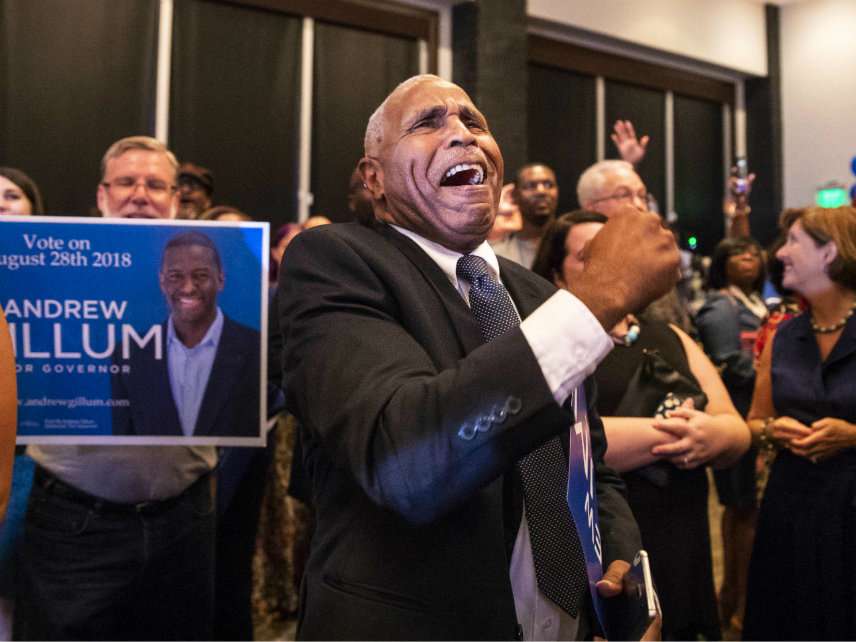Upsets in Florida, Business as Usual in Arizona, and No Clear Answers About Future Elections
A Trump loyalist, a Bernie-backed progressive, and lots of moderates were victorious. It's hard to create an overarching narrative out of that.

Is the GOP simply the party of Donald Trump now, or is there still room for more moderate, establishment-backed candidates? How much influence does the Bernie Sanders wing of the Democratic Party have? Is socialism really that popular?
Those were some of the big unanswered questions heading into yesterday's primary contests, particularly in Florida and Arizona. Now that the results are in, they remain big and unanswered.
Let's start with Florida, where there were some clashing results, to say the least. On the Democratic side, the Sanders-backed Tallahassee Mayor Andrew Gillum won an upset victory over the establishment candidate, former Rep. Gwen Graham (D-Fla.), to win the gubernatorial nomination. Gillum, who could become Florida's first African-American governor, won't say whether he identifies as a democratic socialist, but there's no denying that he's very progressive. (For one thing, he supports Medicare for all.)
Gillum's Republican opponent couldn't be more different. Rep. Ron DeSantis (R-Fla.) is a Fox News regular who really, really wants to build Trump's proposed border wall. Facing establishment-backed former Rep. Adam Putnam (R-Fla.) in the primary, DeSantis was once considered the underdog, though Trump's endorsement this week helped change that.
While Florida's gubernatorial race will pit a hardline Trump supporter against a Sanders-backed outsider, the Senate election will feature two well-known politicians. Incumbent Bill Nelson ran uncontested for the Democrats, while term-limited Gov. Rick Scott easily captured the Republican nomination. Both candidates have been around for a while (Nelson's been a senator since 2001, while Scott became governor in 2011), so neither is an outsider.
In Arizona, there were very few surprises. Rep. Martha McSally was seen as the GOP's establishment pick for Senate, and she easily defeated two conservative firebrands: former state Sen. Kelli Ward and former Maricopa County Sheriff Joe Arpaio. She'll oppose Rep. Kyrsten Sinema, a moderate who was expected to win the Democratic nomination and did. In the race for governor, incumbent Republican Doug Doucy easily defeated his only opponent, while Democrat Davis Garcia, who's more of a progressive than a moderate, won his party's nomination.
Back in June, democratic socialists got excited when Alexandria Ocasio-Cortez upset 10-year House incumbent Rep. Joe Crowley (D–N.Y.). Ocasio-Cortez tried to transfer the magic from her win to other socialists around the country, with mixed results: Gillum and Garcia were both victorious yesterday, but earlier this month a string of progressive insurgents who she endorsed lost big to centrist opponents. Meanwhile, the GOP has room both for Trumpians like DeSantis and relative moderates like Scott and McSally.
If there's one major takeaway from yesterday's results, it's that there isn't one. Evidently, it's not easy to weave a large and diverse country's primaries into a single national narrative.
